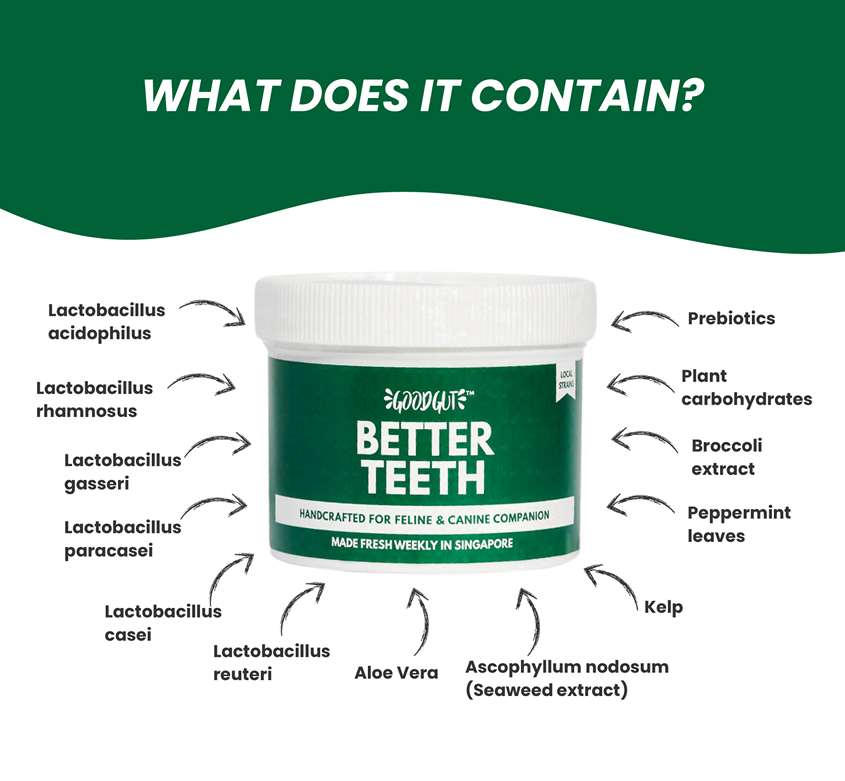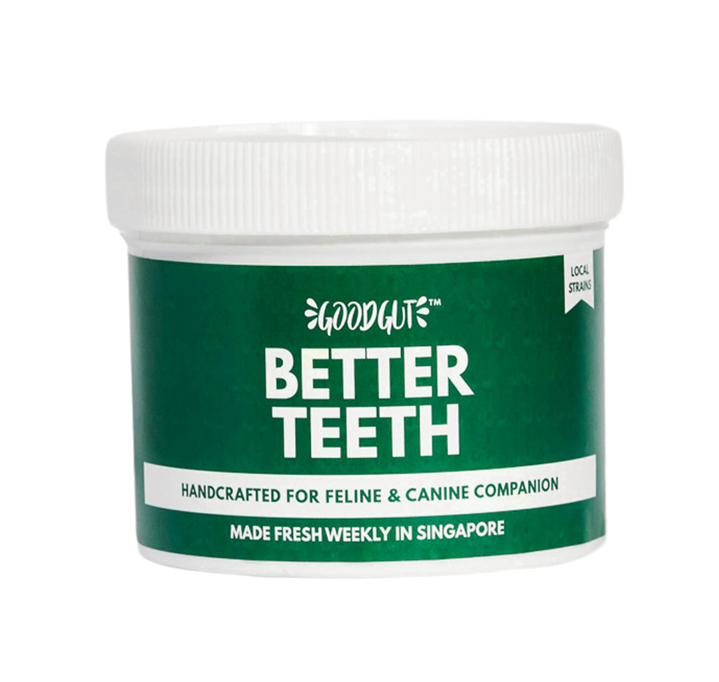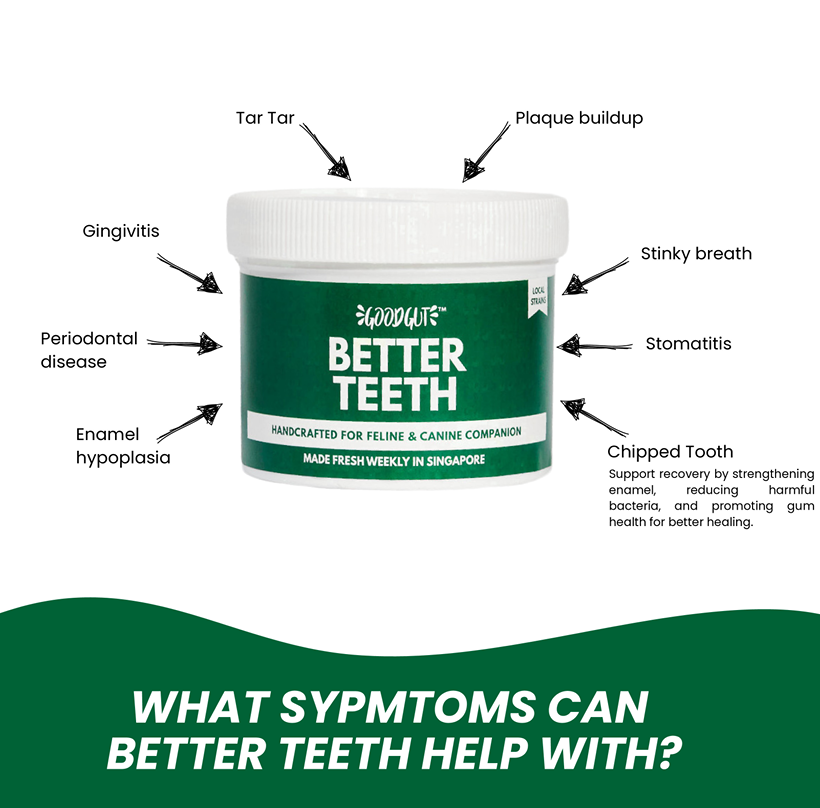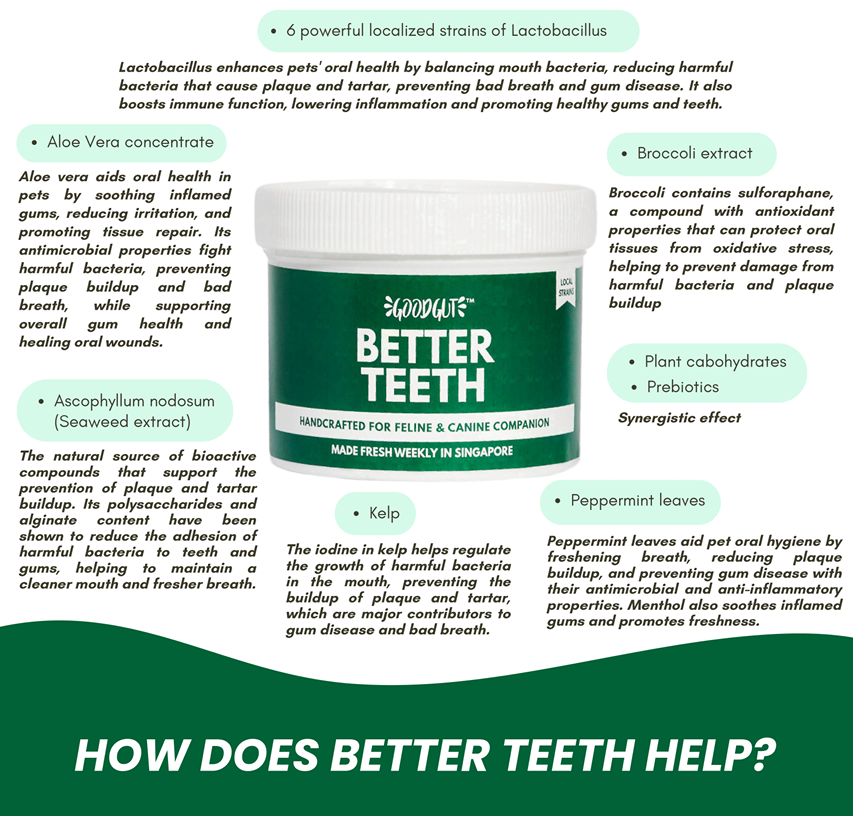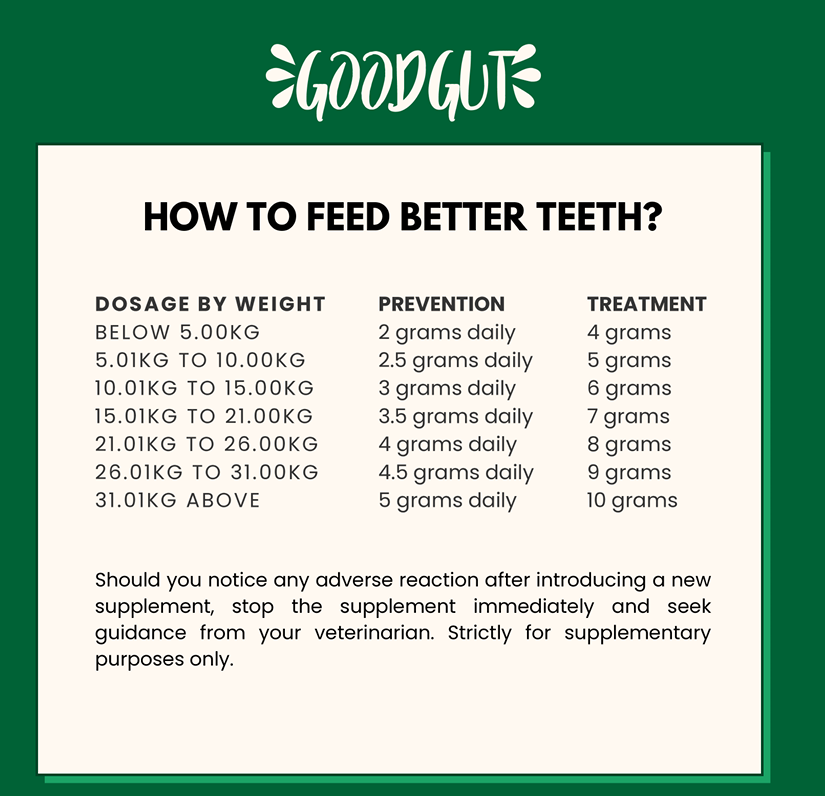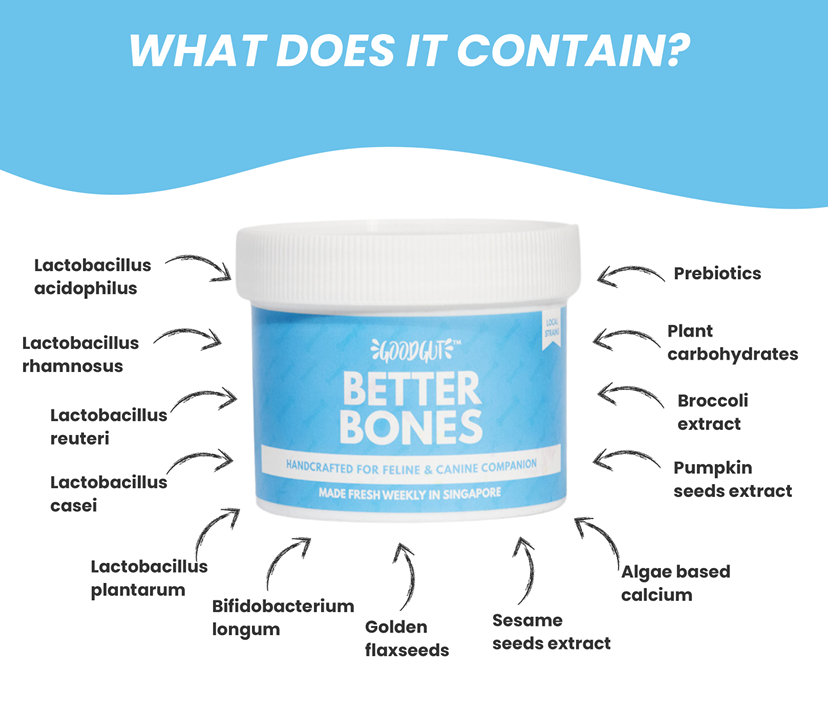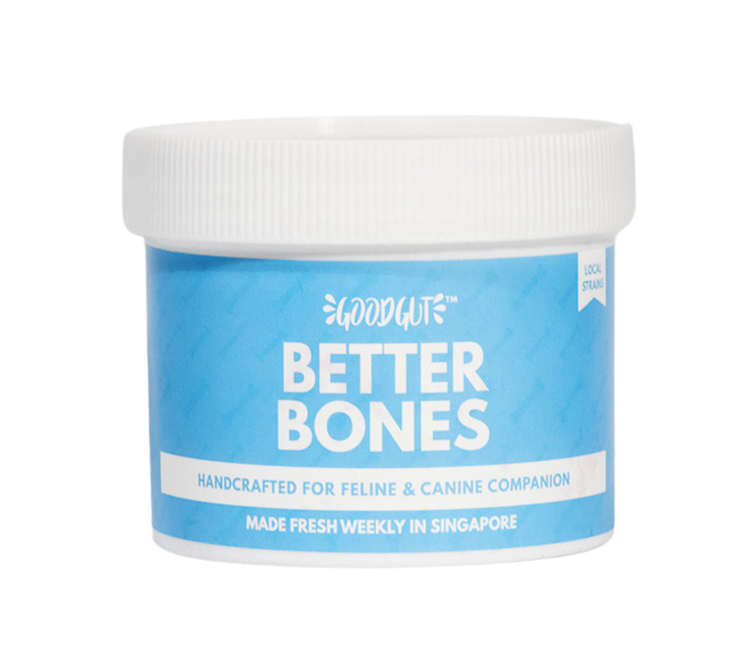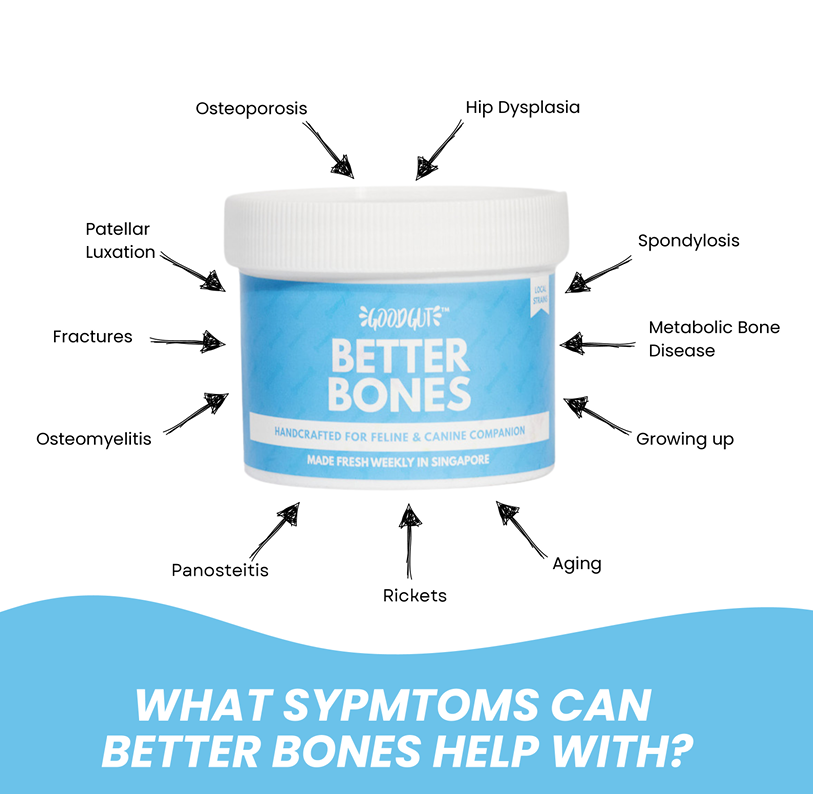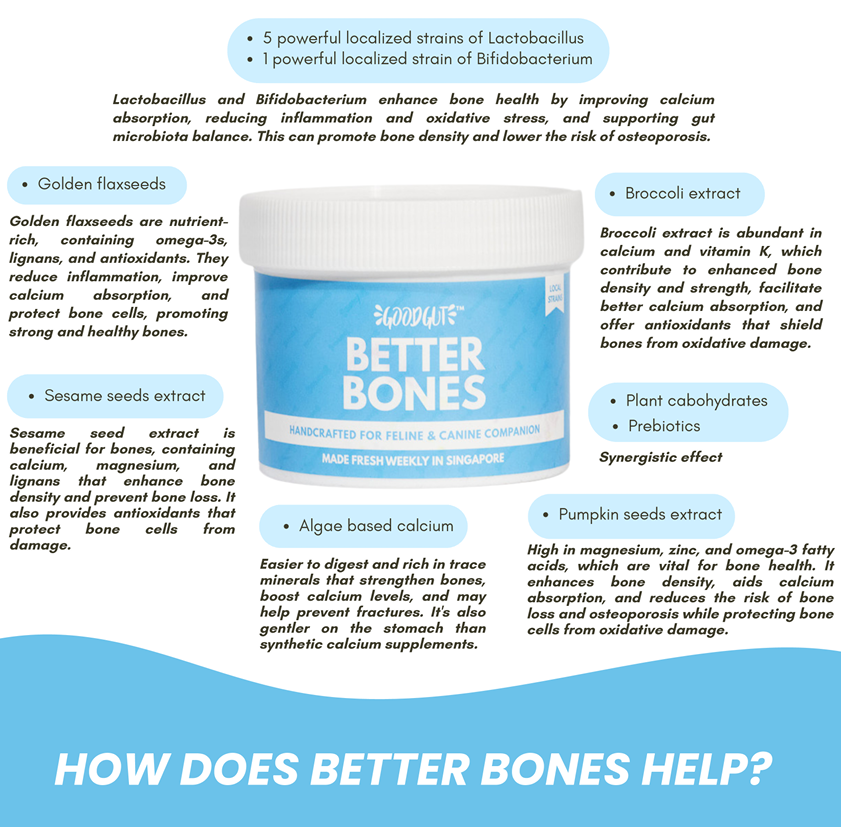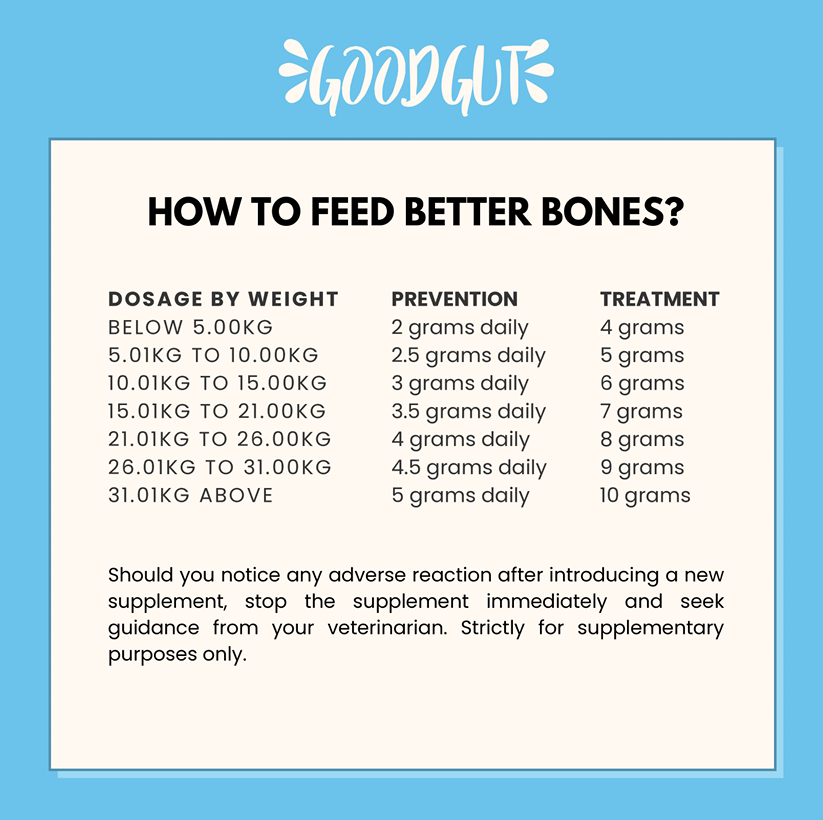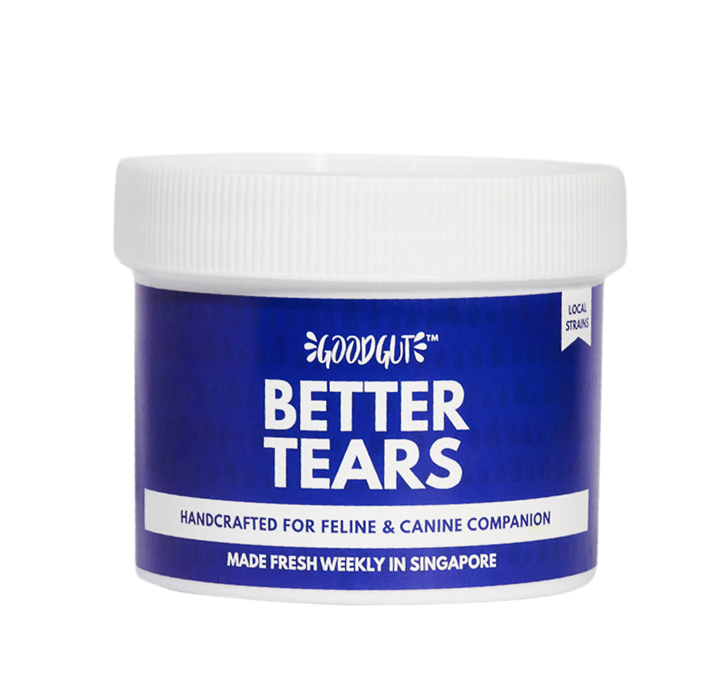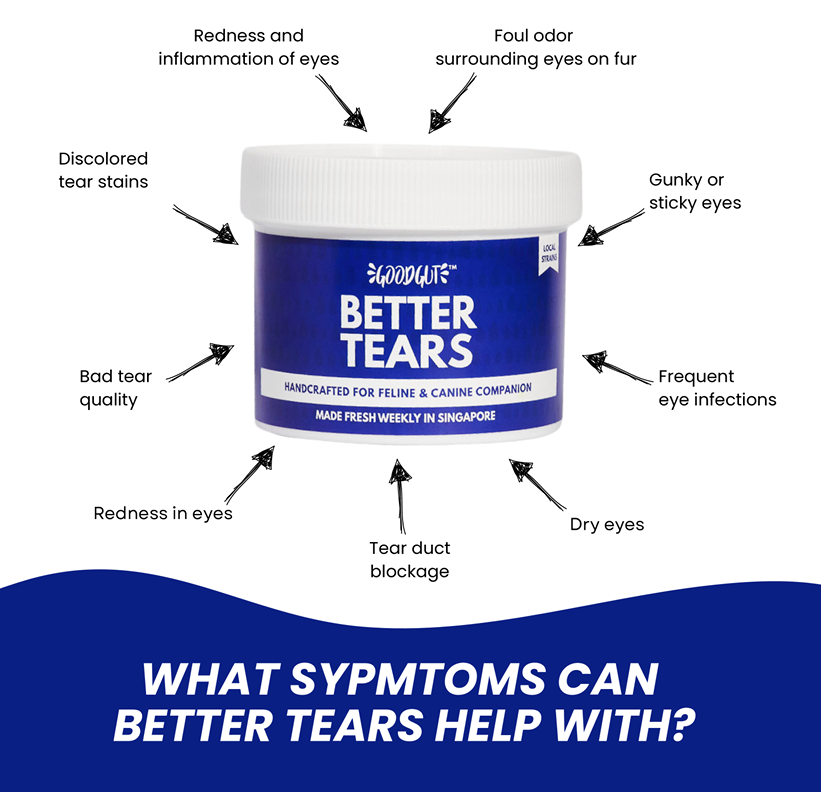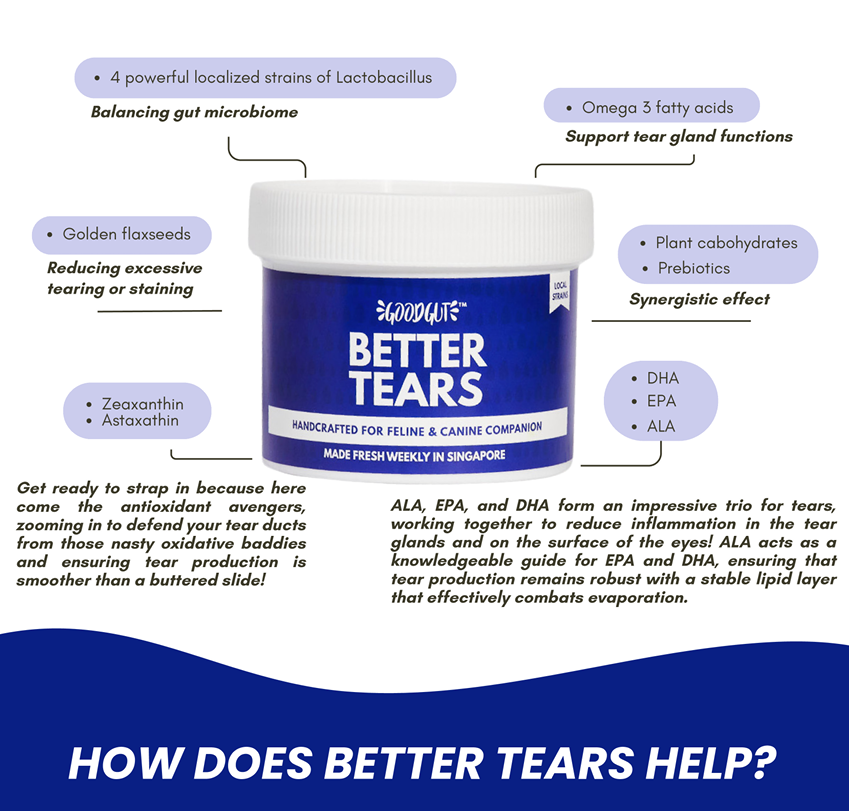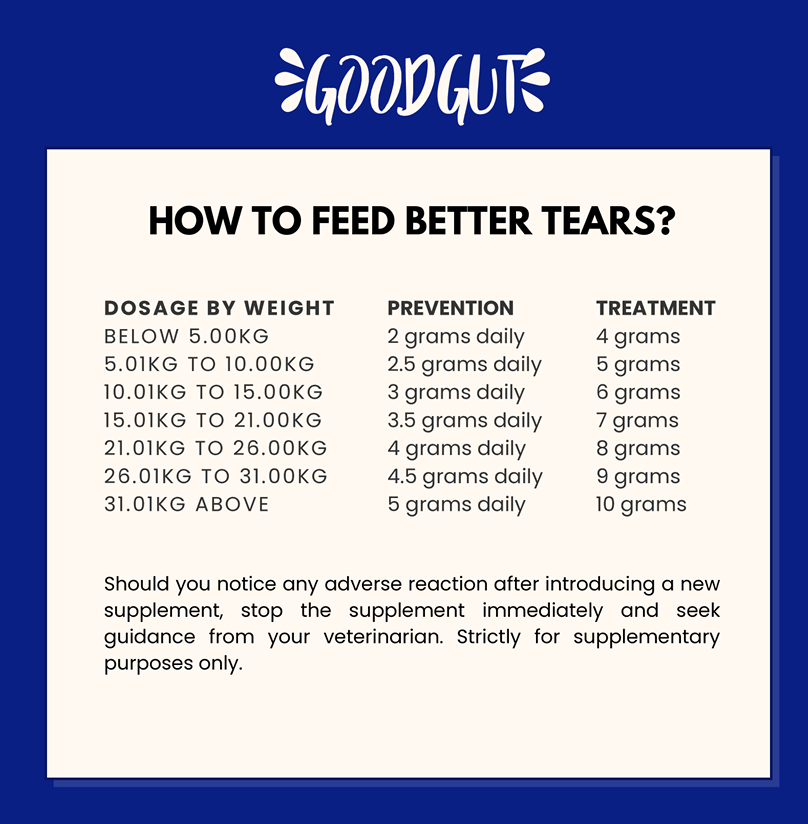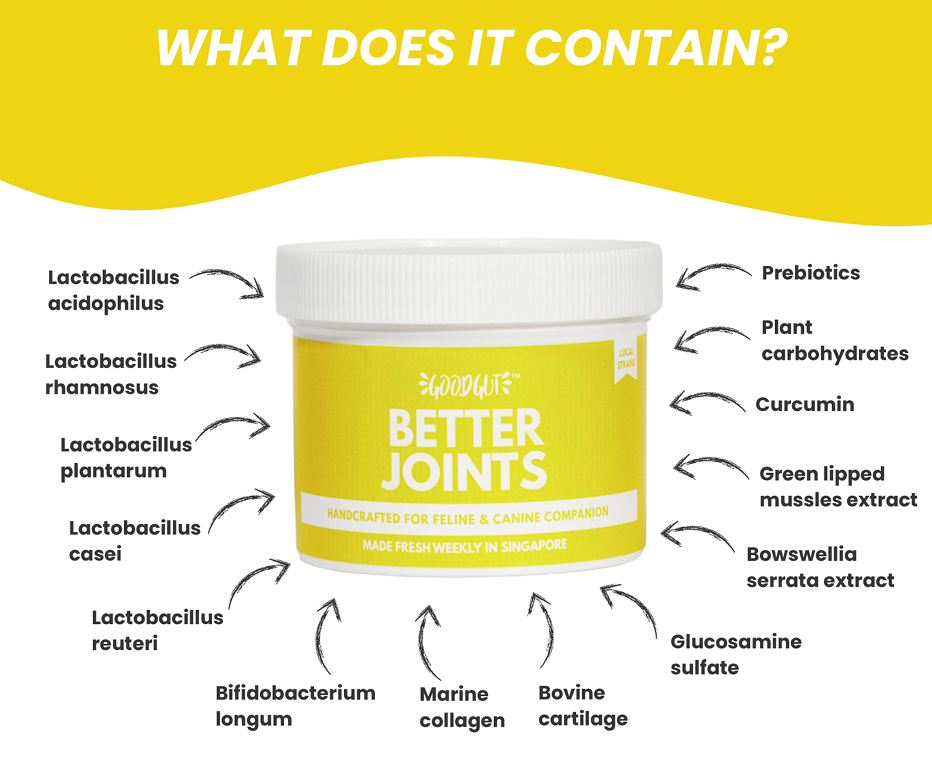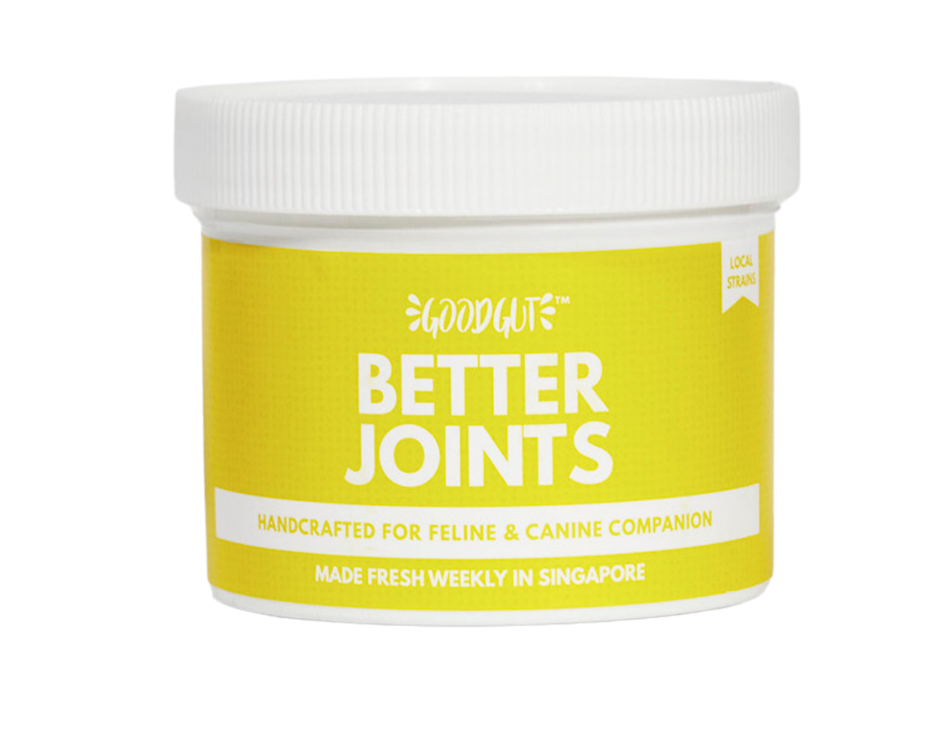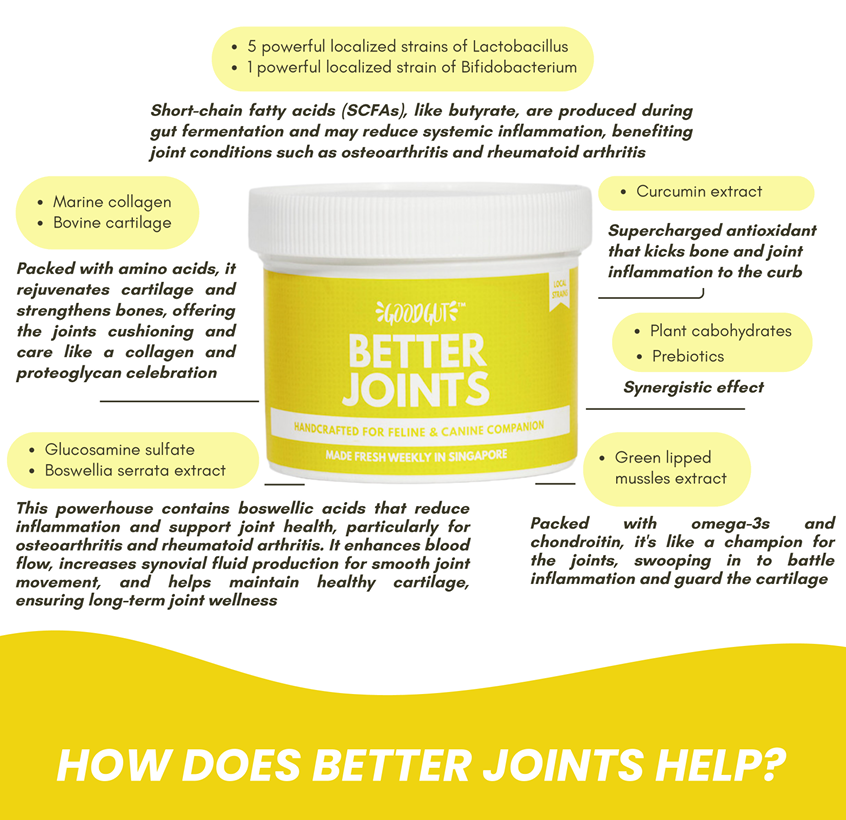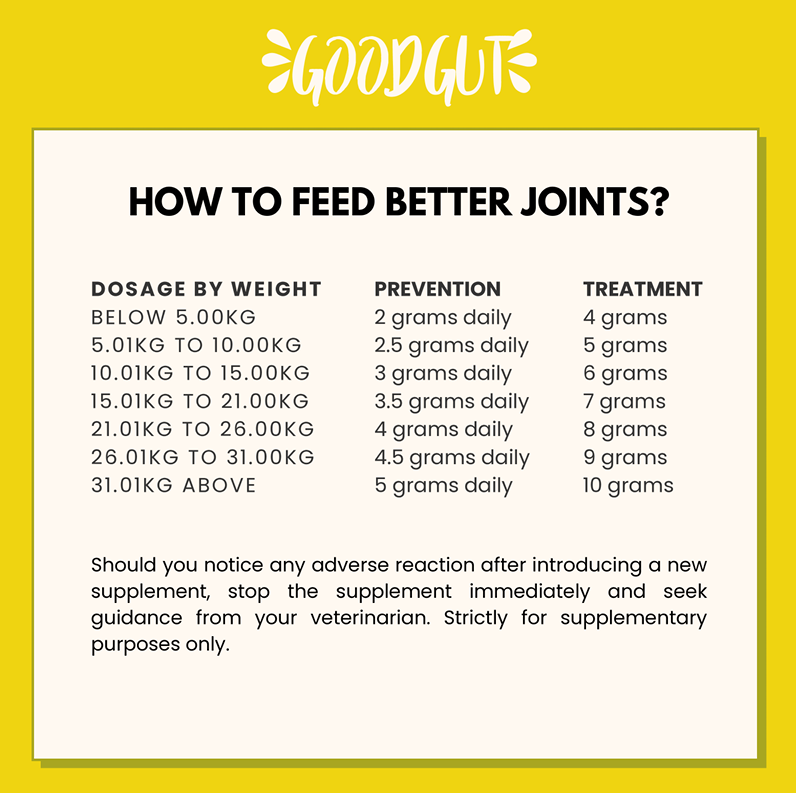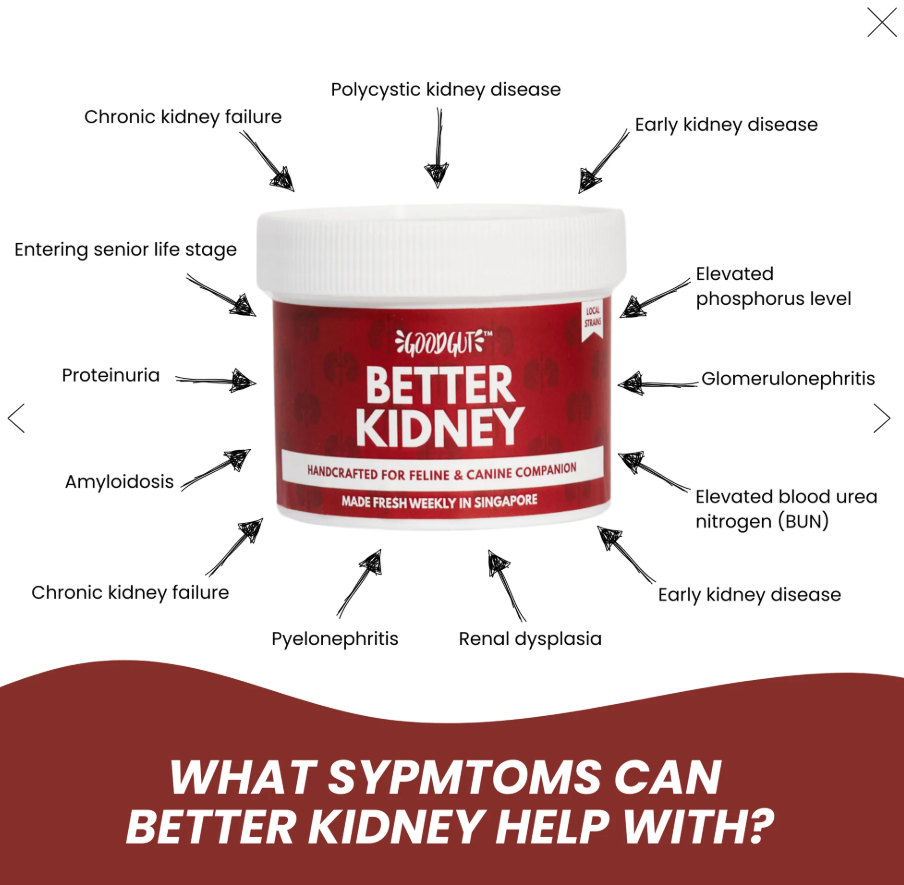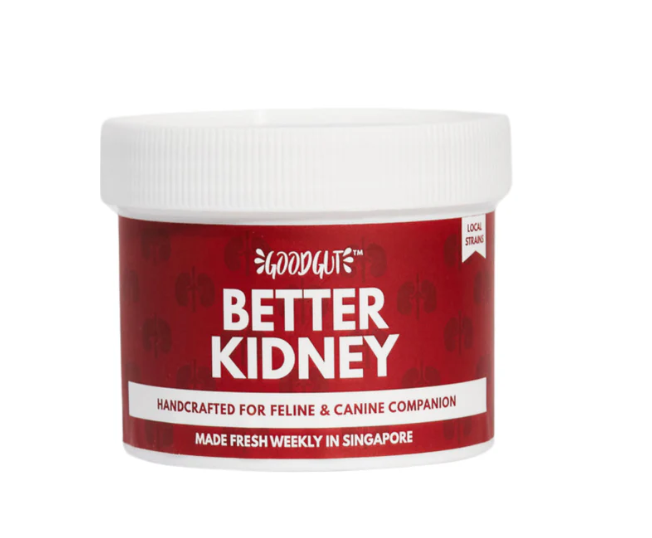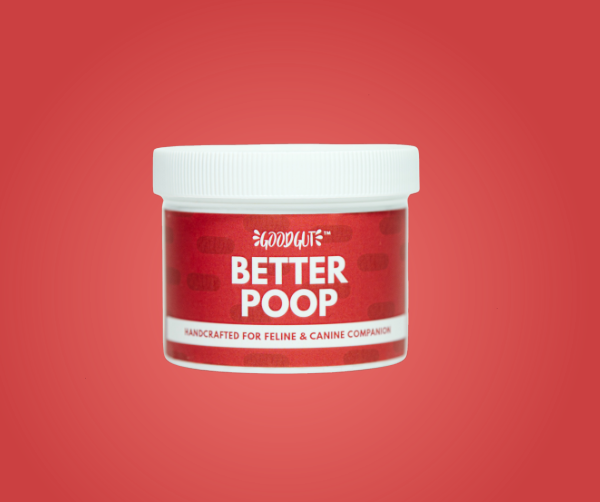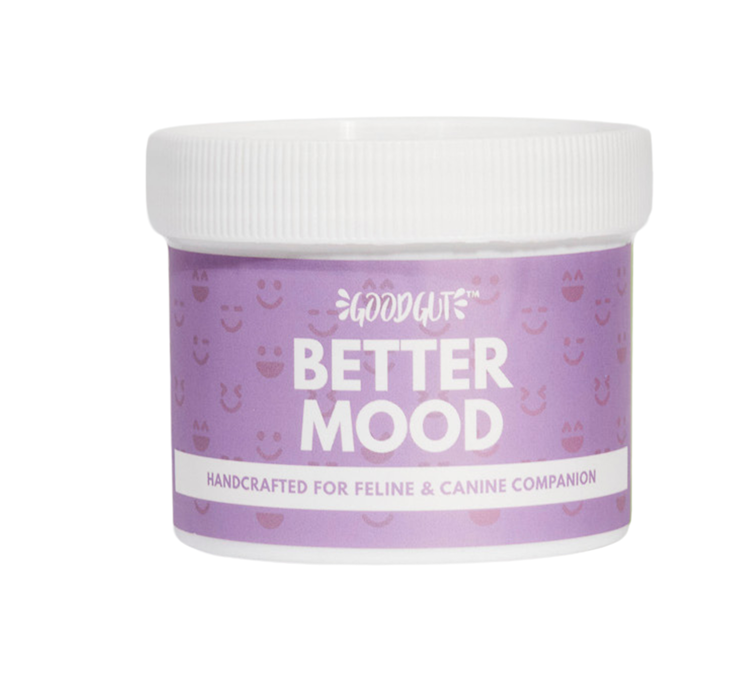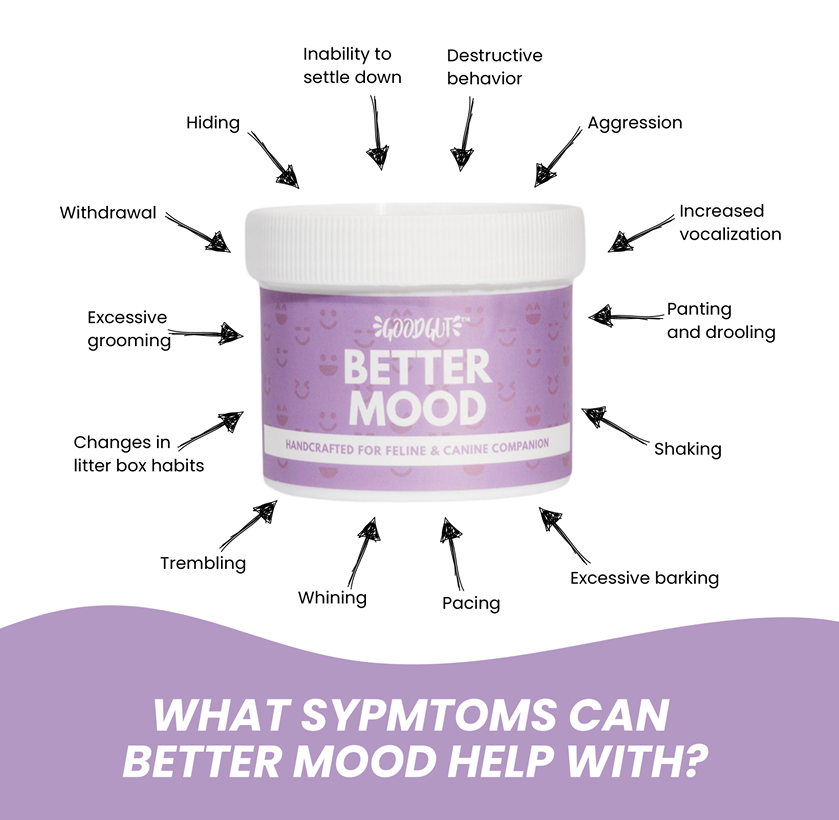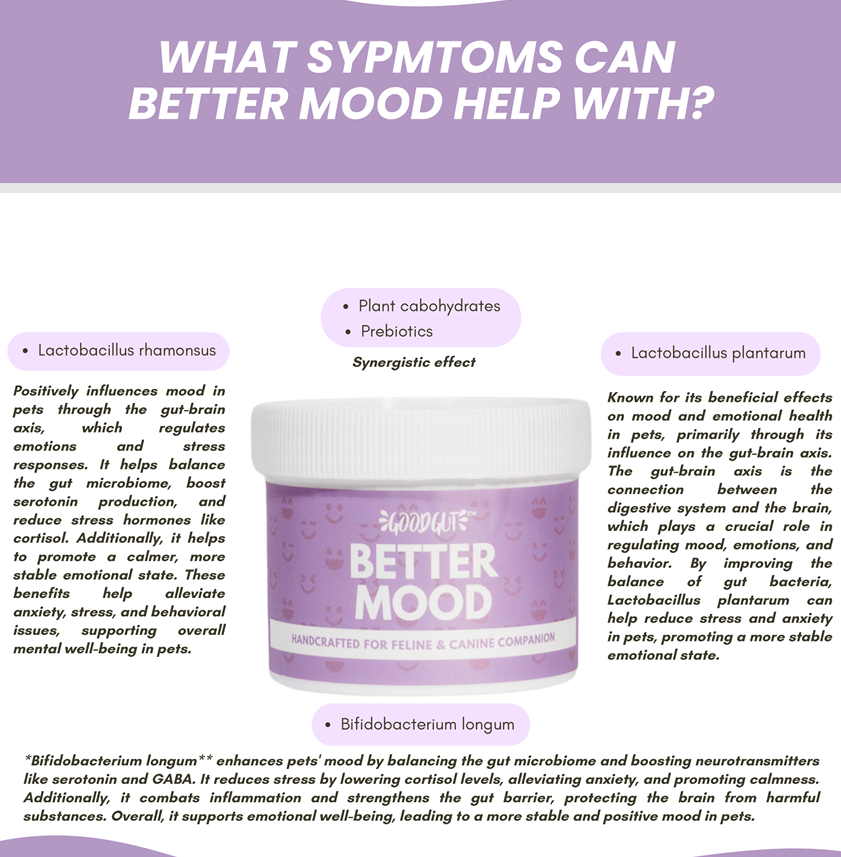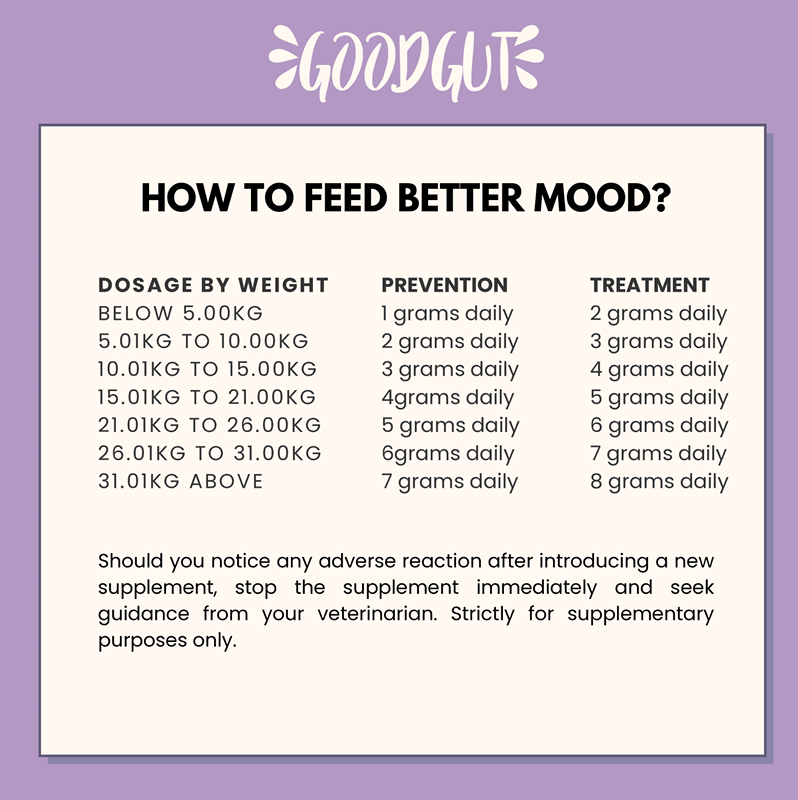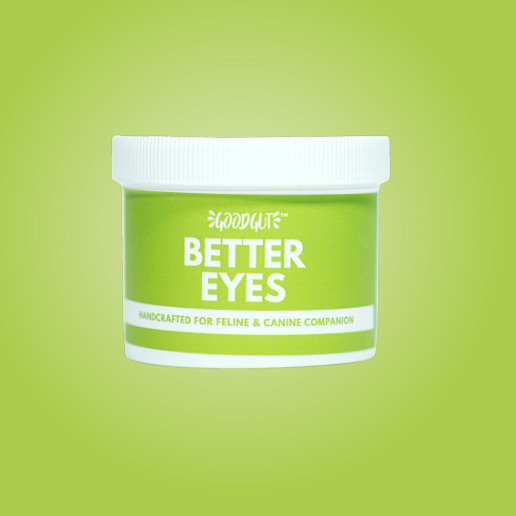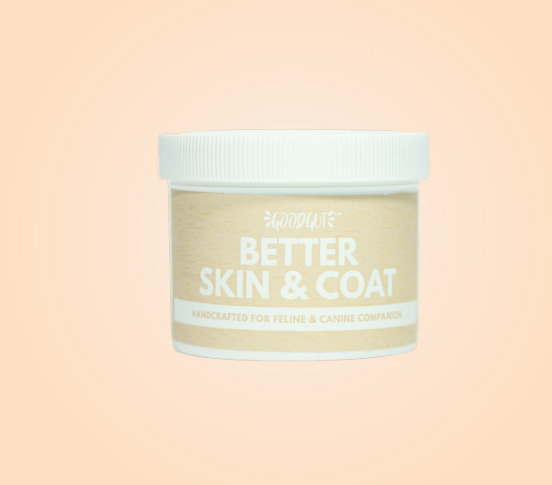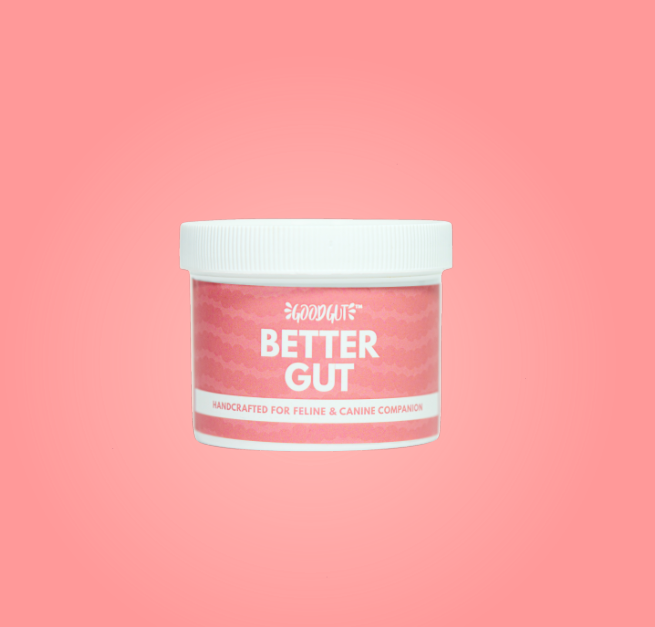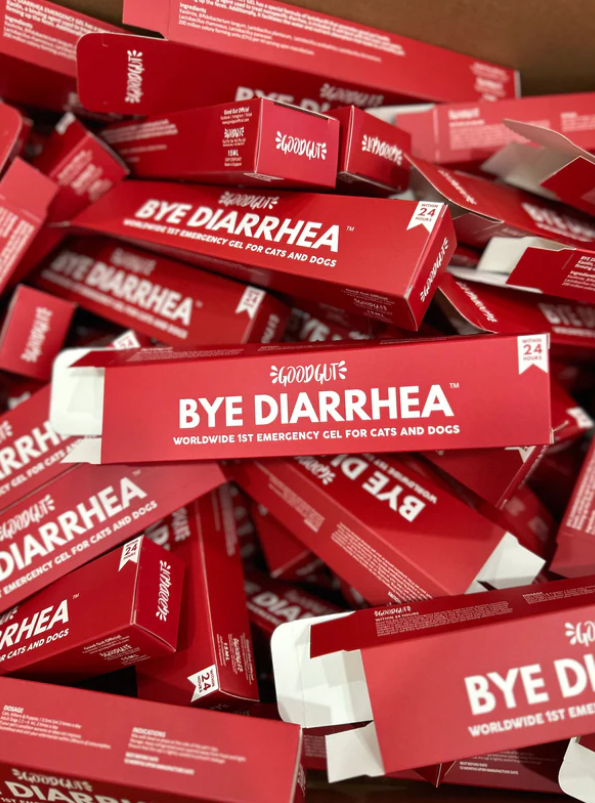Availability
If your Cat or Dog has a history of or is showing signs of...
- Chronic kidney failure
- Early kidney disease
- Entering senior life stage
- Elevated blood urea nitrogen (BUN)
- Elevated phosphorus level
- Proteinuria
- Amyloidosis
- Glomerulonephritis
- Polycystic kidney disease
- Pyelonephritis
- Renal dysplasia
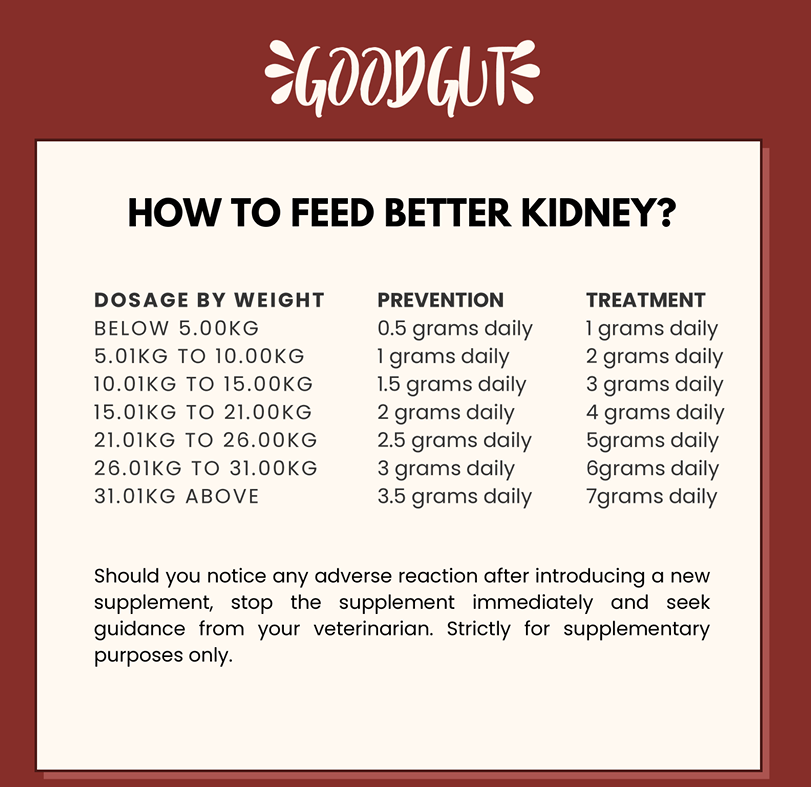
If your Cat or Dog has a history of or is showing signs of...
- Watery diarrhoea
- (cannot be picked up, liquid)
- Watery diarrhoea
- (hard to pick up, liquid with shape)
- Sloppy pile
- (can be picked up, with massive stains on floor)
- Soft stools
- (can be picked up, soft, log shape)
- Bloody stools*
- *Better Poop can help to effectively absorb toxins. If your pet is having an excessive amount of bloody stools, please see your trusted Veterinarian as soon as possible.
Dosage
Below 5.00kg | 2grams per dose
5.01kg to 10.00kg | 3grams per dose
10.01kg to 15.00kg | 4grams per dose
15.01kg to 21.00kg | 5grams per dose
21.01kg to 26.00kg | 6grams per dose
26.01kg to 31.00kg | 7grams per dose
31.01kg above | 8grams per dose
Second Dosage within next 12 hours
If consistency of poop remains the same, proceed with the ‘’second dosage’’ increased dose. If there is improvement within the first dose, continue the ‘’first dosage’’ for the next 12 hours.
Below 5.00kg | 4grams per dose
5.01kg to 10.00kg | 6grams per dose
10.01kg to 15.00kg | 8grams per dose
15.01kg to 21.00kg | 10grams per dose
21.01kg to 26.00kg | 12grams per dose
26.01kg to 31.00kg | 14grams per dose
31.01kg above | 16grams per dose
Once diarrhea has stopped, discontinue Better Poop Powder. This product should not be fed for more than 3 days. Consult your vet immediately if there is no improvement after 24 hours.
Comes in a 150grams bottle without spoon for accurate measurement. Please use a weighing scale to measure supplements from Good Gut as these products are produced and sold in high concentration.
Ingredients: Bifidobacterium Longum, Lactobacillus plantarum, lactobacillus paracasei, Lactobacillus reuteri, Lactobacillus rhamnosus, Lactobacillus acidophilus, Kaolin, Montmorillonite, Prebiotics and Plant carboyhdrates
Montmorillonite
- Regulating the pH balance of the gut creates an environment less conducive to the growth of harmful bacteria and pathogens.
- The process of absorbing excess fluid within the gastrointestinal tract has the potential to solidify loose stools and reduce the risk of dehydration in pets experiencing diarrhea.
- A protective barrier shields the intestinal lining, reducing inflammation and preventing further irritation.
- Offers relief from the distress commonly associated with diarrhea, thus improving the overall comfort of pets.
Kaolin
- When provided correctly, the ingredient is generally gentle on the stomach lining and does not usually cause irritation or further gastrointestinal disturbances.
- Encourages regular gastrointestinal transit and reduces the occurrence and severity of episodes of diarrhea.
- Kaolin assists in the binding of loose stools while also encouraging healthy gut motility, thereby lowering the risk of constipation and promoting effective elimination of waste products.
- It alleviates the stressed digestive system, decreasing the probability of additional occurrences of diarrhea and related distress.
Lactobacillus rhamonsus
- The reduction of intestinal permeability serves to inhibit the release of harmful toxins into the circulatory system.
Lactobacillus paracasei
- Effective in suppressing infections and preventing diarrhea caused by microbial imbalance.
- This microbe is known for its ability to connect to the cells of the intestinal epithelium and colonize itself in the gastrointestinal tract. It is essential for restoring the balance of gut microbiota in pets, especially during episodes of diarrhea that disrupt the microbial balance.
Lactobacillus plantarum
- Restores the healthy balance of gut microbiota by stimulating the growth of beneficial microbes and preventing the spread of harmful pathogens, thus improving overall gut well-being.
- This mechanism serves to prevent the infiltration of toxins and pathogens into the circulatory system.
- By regulating the stress response, it is possible to reduce stress-induced diarrhea.
Lactobacillus acidophilus
- Survives in acidic environments like the stomach, increasing the chances of reaching the intestines alive and maintaining probiotic activity.
- It restores gut microbiota balance.
- Effective in reducing the severity and duration of diarrhea episodes.
Lactobacillus reuteri
- Reduces the risk of diarrhea.
- Controls the pH balance of the gut, thus lowering the favorable conditions for the growth of harmful bacteria while supporting gastrointestinal well-being.
- Improves the functionality of digestive enzymes in the gastrointestinal tract, which improves the process of breaking down and absorbing nutrients.
- Effective in reducing flatulence, which is commonly linked to diarrhea.
- Increases the recovery and resolution of gastrointestinal symptoms in pets, thus minimizing the duration of diarrhea episodes.
Bifidobacterium longum
- Maintaining the preservation of the intestinal barrier in pets.
- Reduces gastrointestinal inflammation.
Prebiotics
- Reduces the risk of diarrhea.
- The gut epithelial cells are stimulated to produce antimicrobial peptides (AMPs), which serve as a defense mechanism against pathogenic bacteria.
Plant Carbohydrates
- Probiotic bacteria require energy and nutrients to grow and thrive. Carbohydrates serve as an essential energy source for probiotic bacteria. They can metabolize various carbohydrates through fermentation to produce energy and maintain their populations in the gut.
- Carbohydrates can also play a role in protecting probiotics during storage and transit. Some probiotic supplements or foods are formulated with carbohydrates as stabilizers or protectants to ensure the viability of the live cultures until consumption.
- Aid probiotics in colonizing and adhering to the gut mucosa. For example, specific carbohydrates called glycans present on the surface of gut epithelial cells can serve as attachment sites for probiotic bacteria, facilitating their colonization in the gut.
- Offer a diverse array of molecules for probiotic bacteria to metabolize.
Strictly for supplementation purpose only.
CFU at time of manufacture: 80 billion per 150grams
When choosing a probiotic for your pet, it is crucial to take into account the colony-forming unit (CFU) content. However, it is important to note that a higher CFU content does not necessarily indicate improved health outcomes. The efficacy of a probiotic is contingent upon several factors, encompassing the particular bacterial strains that are present, their viability, and their capacity to endure the digestive tract and establish colonization within the gastrointestinal tract. Multi-strain products exhibit enhanced efficacy due to the diverse array of probiotic strains, enabling them to assume various functions.
Storage: Keep in a cool and dry area, away from heat and sunlight. To retain the best quality of the treats, you can keep it in the fridge in an airtight container.
Best before: 12 months upon date of manufacture
If your Cat or Dog has a history of or is showing signs of...
- Dry eyes
- Tear stains
- Glaucoma
- Conjunctivitis
- Cherry eye
- Cataracts
- Discharge
- Blurred vision
- (often knocking into objects)
- Sclera redness
- (white part of the eye redness)
- Flaky eyelid
- Retinopathy
Dosage
Below 5.00kg | 4grams daily
5.10kg to 10.00kg | 5grams daily
10.01kg to 15.00kg | 6grams daily
15.01kg to 21.00kg | 7grams daily
21.01kg to 26.00kg | 8grams daily
26.01kg to 31.00kg | 9grams daily
31.00kg above | 10grams daily
Preventative/ Sensitive Gut or 1st month Dosage
Below 5.00kg | 2grams on alternate days
5.01kg to 10.00kg | 2.5grams on alternate days
10.01kg to 15.00kg | 3grams on alternate days
15.01kg to 21.00kg | 3.5grams on alternate days
21.01kg to 26.00kg | 4grams on alternate days
26.01kg to 31.00kg | 4.5grams on alternate days
31.01kg above | 5grams on alternate days
Comes in a 150grams bottle without spoon for accurate measurement. Please use a weighing scale to measure supplements from Good Gut as these products are produced and sold in high concentration.
Ingredients: Lutein, Lactobacillus acidophilus, Lactobacillus casei, Lactobacillus plantarum, Prebiotics, Berries extract, Cranberry extract, Strawberry extract, Blueberry extract, Raspberry extract, Bilberry extract, Blackberry extract and Plant carbohydrates.
Lactobacillus acidophilus
- Minimizes systemic inflammation throughout the body.
- It protects the ocular tissues from oxidative damage.
- Encourages the production of tears and mitigates symptoms associated with ocular dryness.
Lactobacillus casei
- Controls the production of mucus, thereby decreasing excessive eye secretion and fostering improved eye cleanliness and health.
- Helps pets prevent eye infections.
- Reduces allergic reactions, relieving itching, and enhancing eye comfort.
- Reduces ocular strain and fatigue, promoting holistic ocular well-being.
- Allows the functioning of ocular muscles, which leads to improved ocular mobility and improved coordination.
- It lowers the risk of cataracts, a common age-related ocular condition in pets.
- Beneficial gut bacteria produce antioxidants and anti-inflammatory compounds that can potentially protect against age-related macular degeneration, a major cause contributing to vision loss in pets.
Lactobacillus plantarum
- The ocular tissues are safeguarded against oxidative damage through the production of antioxidants.
- Encourages the efficient absorption of essential nutrients for eye health, such as vitamins A, C, and E, along with zinc and omega-3 fatty acids.
- Supports the maintenance of optimal optic nerve health.
Lutein
- Protects the health of the retina, the sensitive light tissue located at the posterior part of the eye.
- Supports safeguarding the macula from harm and promotes overall macular well-being.
- This factor facilitates the maintenance of clear vision and visual acuity in pets.
- Assists in enhancing or preserving night vision in pets.
- May improve pets' capacity to differentiate between various hues of light and darkness.
- Reduces ocular inflammation.
- Provides ocular protection against the damaging effects of ultraviolet (UV) radiation emitted by the sun.
- Improves ocular blood circulation.
Berries extract
(Cranberry extract, Strawberry extract, Blueberry extract, Raspberry extract, Bilberry extract, Blackberry extract)
- Rich in antioxidants, which have the potential to protect the eyes against oxidative harm induced by free radicals.
- It has the potential to enhance tear production and reduce the occurrence of dry eye syndrome in pets.
- It prevents or decelerates the progression of age-related visual changes such as cataracts and macular degeneration.
- Facilitates the recuperation of pets undergoing eye injuries or surgeries.
- The administration of bilberry extract has the potential to decrease intraocular pressure, thereby potentially reducing the risk of glaucoma in pets.
- It facilitates the synthesis of tears of superior quality, thereby enhancing the durability of the tear film and inhibiting the process of tear evaporation.
- It increases the ocular tissues' durability, providing protection against potential harm from environmental pollutants and toxins.
- The tear film and the eyelid's ability to protect against foreign particles and pathogens are among the enhanced ocular defense mechanisms.
- Ensuring the preservation of the optic nerve's well-being.
- Promotes the health of the retinal tissue.
- Alleviates ocular inflammation.
Plant Carbohydrates
- Probiotic bacteria require energy and nutrients to grow and thrive. Carbohydrates serve as an essential energy source for probiotic bacteria. They can metabolize various carbohydrates through fermentation to produce energy and maintain their populations in the gut.
- Carbohydrates can also play a role in protecting probiotics during storage and transit. Some probiotic supplements or foods are formulated with carbohydrates as stabilizers or protectants to ensure the viability of the live cultures until consumption.
- Aid probiotics in colonizing and adhering to the gut mucosa. For example, specific carbohydrates called glycans present on the surface of gut epithelial cells can serve as attachment sites for probiotic bacteria, facilitating their colonization in the gut.
- Offer a diverse array of molecules for probiotic bacteria to metabolize.
Strictly for supplementation purpose only.
CFU at time of manufacture: 80 billion per 150grams
When choosing a probiotic for your pet, it is crucial to take into account the colony-forming unit (CFU) content. However, it is important to note that a higher CFU content does not necessarily indicate improved health outcomes. The efficacy of a probiotic is contingent upon several factors, encompassing the particular bacterial strains that are present, their viability, and their capacity to endure the digestive tract and establish colonization within the gastrointestinal tract. Multi-strain products exhibit enhanced efficacy due to the diverse array of probiotic strains, enabling them to assume various functions.
Storage: Keep in a cool and dry area, away from heat and sunlight. To retain the best quality of the treats, you can keep it in the fridge in an airtight container.
Best before: 12 months upon date of manufacture
If your Cat or Dog has a history of or is showing signs of...
- Shedding
- Red and itchy skin
- Dandruff
- Hotspots
- Atopic dermatitis
- Yeast infection
- Fungal infection
- Ringworm
- Excessive licking of paws
Dosage
Below 5.00kg | 4grams daily
5.10kg to 10.00kg | 5grams daily
10.01kg to 15.00kg | 6grams daily
15.01kg to 21.00kg | 7grams daily
21.01kg to 26.00kg | 8grams daily
26.01kg to 31.00kg | 9grams daily
31.00kg above | 10grams daily
Preventative/ Sensitive Gut or 1st month Dosage
Below 5.00kg | 2grams on alternate days
5.01kg to 10.00kg | 2.5grams on alternate days
10.01kg to 15.00kg | 3grams on alternate days
15.01kg to 21.00kg | 3.5grams on alternate days
21.01kg to 26.00kg | 4grams on alternate days
26.01kg to 31.00kg | 4.5grams on alternate days
31.01kg above | 5grams on alternate days
Comes in a 150grams bottle without spoon for accurate measurement. Please use a weighing scale to measure supplements from Good Gut as these products are produced and sold in high concentration.
Ingredients: β-glucan, Lactobacillus reuteri, Lactobacillus plantarum, Prebiotics and Plant carbohydrates.
β-glucan
- It facilitates the preservation of a healthy skin barrier, therefore reducing the loss of moisture and safeguarding against various environmental stressors.
- The anti-inflammatory properties of this substance contribute to the reduction of skin redness, which is commonly associated with inflammation and irritation.
- Promotes the production of growth factors that are essential for the regeneration of skin cells.
- The antioxidant properties of the ingredient serve to safeguard the skin against potential harm resulting from environmental pollutants and UV radiation.
- Facilitates the synthesis of collagen, thereby enhancing the firmness and elasticity of the skin.
- It enhances skin hydration and supports skin regeneration, which leads to a smoother and softer skin texture.
- Reduces irritation in delicate skin and reduces sensitivity to external irritants.
- Aids in the identification and elimination of pathogens prior to their ability to induce infections or skin complications.
- It decreases the skin's sensitivity and reduces its responsiveness to typical allergens, thus reducing allergic reactions and skin irritation.
- It helps the skin's detoxification mechanism by eliminating toxins and pollutants that have a tendency to accumulate on the surface of the skin.
- Facilitates accelerated wound healing of skin lesions caused by insect bites or stings, thereby reducing pain and reducing the possibility of infection.
- Minimizes the skin's susceptibility to damaging chemicals and toxins, which avoids skin irritation and sensitization.
Lactobacillus reuteri
- Reduces systemic inflammation, a factor that may contribute to the development of dermatological conditions such as allergies and dermatitis.
- Supports pets in developing resistance against infections and promoting optimal skin health.
- Alleviates the intensity of skin-based allergic reactions.
- Facilitates the efficient absorption of essential nutrients required for the maintenance of skin and coat health, including fatty acids, vitamins, and minerals.
- The skin protects itself from pathogens' excessive growth.
- Reduces dryness and enhances the integrity of the skin barrier.
- It helps maintain skin pH balance and prevents the growth of bacteria that cause unpleasant odors on the skin.
- Environmental pollutants and ultraviolet (UV) radiation protect the skin.
- It combats the redness caused by inflammation and irritation.
- Encourages the synthesis of collagen and preserves the elasticity of the skin.
- Controls sebum secretion in the skin, thereby mitigating the chance of developing oily or dry skin conditions.
- The product effectively manages skin hydration and reduces the occurrence of dandruff-related flakiness.
Lactobacillus plantarum
- Combats skin irritation and reduces redness or inflammation induced by diverse irritants.
- The maintenance of adequate skin hydration levels serves to prevent the occurrence of dryness and flakiness.
- It helps in minimizing inflammation and facilitating the healing process of hot spots.
- The regulation of the hair growth cycle and the reduction of excessive shedding contribute to maintaining a coat that appears healthier.
- Facilitates the process of skin cell regeneration and turnover, which promotes the rejuvenation of healthy skin tissue.
- May reduce skin pigmentation resulting from sun exposure or the natural process of aging, resulting in a more uniform complexion.
- Enhances the general well-being and durability of the skin, leading to a lively and healthy appearance.
Prebiotics
- The immune response is modulated, reducing systemic inflammation that may contribute to the development of skin conditions in pets.
- Prevents the entry of harmful substances into the bloodstream, thereby avoiding the potential onset of skin problems.
- Alleviates itchiness linked to a variety of skin disorders in pets.
- Reduces the growth of malodorous bacteria on the skin.
Plant Carbohydrates
- Probiotic bacteria require energy and nutrients to grow and thrive. Carbohydrates serve as an essential energy source for probiotic bacteria. They can metabolize various carbohydrates through fermentation to produce energy and maintain their populations in the gut.
- Carbohydrates can also play a role in protecting probiotics during storage and transit. Some probiotic supplements or foods are formulated with carbohydrates as stabilizers or protectants to ensure the viability of the live cultures until consumption.
- Aid probiotics in colonizing and adhering to the gut mucosa. For example, specific carbohydrates called glycans present on the surface of gut epithelial cells can serve as attachment sites for probiotic bacteria, facilitating their colonization in the gut.
- Offer a diverse array of molecules for probiotic bacteria to metabolize.
Strictly for supplementation purpose only.
CFU at time of manufacture: 80 billion per 150grams
When choosing a probiotic for your pet, it is crucial to take into account the colony-forming unit (CFU) content. However, it is important to note that a higher CFU content does not necessarily indicate improved health outcomes. The efficacy of a probiotic is contingent upon several factors, encompassing the particular bacterial strains that are present, their viability, and their capacity to endure the digestive tract and establish colonization within the gastrointestinal tract. Multi-strain products exhibit enhanced efficacy due to the diverse array of probiotic strains, enabling them to assume various functions.
Storage: Keep in a cool and dry area, away from heat and sunlight. To retain the best quality of the treats, you can keep it in the fridge in an airtight container.
Best before: 12 months upon date of manufacture
If your Cat or Dog has a history of or is showing signs of...
- Colitis
- Bile vomiting
- Bad breath & gas
- Irritable bowel syndrome
- Irritable bowel disease
- Inconsistent stool
- Indigestion
- Food sensitivities
- Food allergies
- Low immunity
- Nutrients deficiency
- Pancreatitis
- Undigested food found in poop
Dosage
Below 5.00kg | 4grams daily
5.10kg to 10.00kg | 5grams daily
10.01kg to 15.00kg | 6grams daily
15.01kg to 21.00kg | 7grams daily
21.01kg to 26.00kg | 8grams daily
26.01kg to 31.00kg | 9grams daily
31.00kg above | 10grams daily
Preventative/ Sensitive Gut or 1st month Dosage
Below 5.00kg | 2grams on alternate days
5.01kg to 10.00kg | 2.5grams on alternate days
10.01kg to 15.00kg | 3grams on alternate days
15.01kg to 21.00kg | 3.5grams on alternate days
21.01kg to 26.00kg | 4grams on alternate days
26.01kg to 31.00kg | 4.5grams on alternate days
31.01kg above | 5grams on alternate days
Comes in a 150grams bottle without spoon for accurate measurement. Please use a weighing scale to measure supplements from Good Gut as these products are produced and sold in high concentration.
Ingredients: Lactobacillus acidophilus, Lactobacillus reuteri, Lactobacillus plantarum, Lactobacillus rhamnosus, Lactobacillus paracasei, Bifidobacterium Longum, Prebiotics and Plant carbohydrates.
Lactobacillus reuteri
- Facilitates the process of breaking down and digesting nutrients from food.
- The immune system is strengthened, thus helping pets fight infections and illnesses.
- Enhances digestion to alleviate gas and bloating in pets.
- Treats symptoms associated with food intolerances or sensitivities in pets.
- Contributes to the prevention and control of obesity in pets.
- Minimizes the likelihood of specific infections in pets, such as kennel cough or respiratory infections.
- This intervention reduces the chance of antimicrobial-induced diarrhea in pets undergoing medical treatment.
Lactobacillus plantarum
- The production of lactic acid serves to sustain an acidic gut environment, thereby inhibiting the growth of harmful bacteria.
- Pets can experience relief from gastrointestinal symptoms such as diarrhea, constipation, and bloating.
- Facilitates the process of breaking down and absorbing nutrients from food, ensuring the most efficient uptake.
- Pets with conditions such as inflammatory bowel disease may benefit from possessing anti-inflammatory properties.
- Minimizes the risk of allergies or autoimmune disorders in pets.
Lactobacillus rhamonsus
- Combats symptoms of inflammatory bowel disease and other digestive disorders by reducing inflammation in the gut.
- Encourages the synthesis of short-chain fatty acids, thereby supplying cellular energy to the colonic epithelial cells.
- Contributes to minimizing the growth of harmful microorganisms in the gastrointestinal tract.
- Generates advantageous fatty acids, which promote the well-being of the skin and coat.
Lactobacillus paracasei
- Responsible for the synthesis of advantageous compounds such as vitamins and enzymes.
- Ensures the breakdown of complex carbohydrates, thereby reducing the risk of gastrointestinal problems associated with carbohydrate fermentation.
- Improves the gastrointestinal system's capacity to absorb essential nutrients, including calcium, magnesium, and iron.
- The maintenance of a healthy gut mucus layer is facilitated by its contribution, which serves as a protective barrier against pathogens.
Lactobacillus acidophilus
- Provides assistance in regulating gastrointestinal transit.
- Maintains a stable pH level in the gastrointestinal tract, thereby establishing an environment that is less favorable for the proliferation of harmful bacteria.
- This intervention aims to mitigate symptoms associated with irritable bowel syndrome (IBS) in pets through the reduction of inflammation and enhancement of gut function.
- Facilitates the generation of antibodies and immune cells within the gastrointestinal tract.
- Improves the integrity of the gut mucosa, thereby decreasing the chance of gastric ulcers in pets.
Lactobacillus reuteri
- Increases gut health and resilience in pets to mitigate stress-induced gastrointestinal problems.
- Maintains ideal blood glucose levels in pets, promoting metabolic well-being and reducing the risk of developing diabetes.
- Assists in minimizing symptoms of colic in canines and felines by facilitating gastrointestinal comfort and decreasing gastrointestinal distress.
Bifidobacterium longum
- It helps facilitate the proliferation of advantageous bacteria that synthesize antimicrobial compounds, thereby aiding in the regulation of detrimental pathogen proliferation.
- Promotes the digestion of complex carbohydrates, thereby decreasing the probability of indigestion in pets.
- Facilitates the synthesis of butyrate, a type of short-chain fatty acid that provides nourishment to the cells that line the colon and promotes the overall health of the gut.
- Lowers levels of ammonia in the gastrointestinal tract, which can be advantageous for pets experiencing liver problems.
Prebiotics
- These fibers play an essential role in preserving the integrity of the gastrointestinal barrier, thereby preventing the infiltration of toxins and pathogens into the bloodstream.
- Boost the synthesis of advantageous fatty acids within the gastrointestinal tract.
- Manage the appetite and satiety of pets, encouraging the adoption of healthy eating patterns and weight control.
Plant Carbohydrates
- Probiotic bacteria require energy and nutrients to grow and thrive. Carbohydrates serve as an essential energy source for probiotic bacteria. They can metabolize various carbohydrates through fermentation to produce energy and maintain their populations in the gut.
- Carbohydrates can also play a role in protecting probiotics during storage and transit. Some probiotic supplements or foods are formulated with carbohydrates as stabilizers or protectants to ensure the viability of the live cultures until consumption.
- Aid probiotics in colonizing and adhering to the gut mucosa. For example, specific carbohydrates called glycans present on the surface of gut epithelial cells can serve as attachment sites for probiotic bacteria, facilitating their colonization in the gut.
- Offer a diverse array of molecules for probiotic bacteria to metabolize.
Strictly for supplementation purpose only.
CFU at time of manufacture: 80 billion per 150grams
When choosing a probiotic for your pet, it is crucial to take into account the colony-forming unit (CFU) content. However, it is important to note that a higher CFU content does not necessarily indicate improved health outcomes. The efficacy of a probiotic is contingent upon several factors, encompassing the particular bacterial strains that are present, their viability, and their capacity to endure the digestive tract and establish colonization within the gastrointestinal tract. Multi-strain products exhibit enhanced efficacy due to the diverse array of probiotic strains, enabling them to assume various functions.
Storage: Keep in a cool and dry area, away from heat and sunlight. To retain the best quality of the treats, you can keep it in the fridge in an airtight container.
Best before: 12 months upon date of manufacture
Good Gut Probiotic Treats offer a convenient and enjoyable way to support gut health. By incorporating specific strains of probiotics and prebiotics into tasty treats, individuals and pets can experience the numerous benefits associated with a balanced gut microbiome. As with any dietary supplement, it's essential to consult with a healthcare professional or veterinarian before adding Good Gut Probiotic Treats to your or your pet's daily routine to ensure they are suitable for your specific needs. Whether you're looking to improve digestion, boost immunity, or simply enjoy a delicious snack, these treats offer a promising solution for promoting overall well-being through a healthier gut.
Nett Weight: 100grams
Estimated pieces: 90-100 pieces
Ingredients: Fermented Organic Oatmeal, Lactobacillus blend, Lutein.
Storage: Keep in a cool and dry area, away from heat and sunlight. To retain the best quality of the treats, you can keep it in the fridge in an airtight container.
Best before: 12 months upon date of manufacture
A good intestinal health starts with Good Gut Probiotic Gel. Lactobacillus is good for human and animal’s health. Studies by Lactobacillus researchers worldwide have shown the health benefits of consuming Lactobacillus.
Boosts the immune system
Brighter vision and added antioxidants
Healthier digestive system
Helps to reduce stressImproves the condition of the coat and prevents shedding
Improves nutrient uptake
May counteracts the side effects of medications such as antibiotics and antifungals
Natural and healthy coat shine
Resolves problems associated with flatulence such as bad breath, gas and smelly feces
Suppress harmful bacteria
Reduces body odour
SIMPLE| Simply incorporate into your pet's regular diet.
CREATIVE| Infuse Good Gut Probiotic gel into a frozen snack such as Ice cubes or Ice Lolli.
CONVENIENT| Dispense some Good Gut Probiotic Gel, and place it on the tip of your finger so that your pet may lick it off.
Ingredients: Lactobacilli: Lactobacillus acidophilus, Lactobacillus fermentum, Lactobacillus rhamnosus, Lactobacillus paracasei, Bifidobacterium longum, Lactobacillus plantarum, Cereal Prebiotics, Calcium, Oil and Xanthan Gum.
Recommended Dosage:
Kittens, Puppies, Chinchillas, Hamster, Rabbits
0.5mls on alternate days
Adult Cats and Dogs
2-4ml twice daily. Start with 0.5ml to 1ml twice a day for a week, then increase to 2mls.
- 1
- 2

